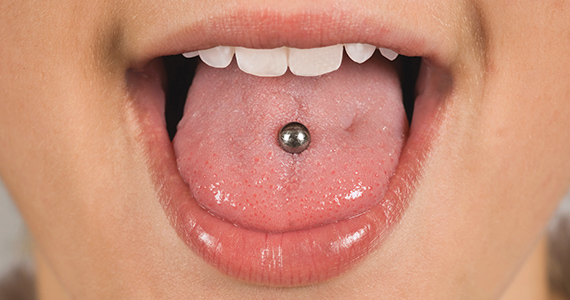Oral Piercings
Learn about oral piercings

What are oral piercings?
Oral piercings are small holes made on the inside of the mouth (intraoral) or the type that can be seen on the outside of the mouth (perioral). They are not a new fad. In fact, they are a common form of body art. In some cultures, they may be representative of marital or financial status, coming of age, courage or simply self-expression.
Oral piercings include common types like tongue, lip and cheek piercings. They may also include the following:
- Frenum piercings that go through the tissue that connects the lips to the gums or tongue to the floor of the mouth.
- Uvula piercings that go through the soft tissue that hangs down at the back of the throat.
Risks with oral piercings
A number of complications may occur as a result of oral piercings. According to the American Dental Association, risks associated with oral piercings include:
- Infection, pain and swelling
- Bleeding
- Damage to teeth, fillings, crowns and gums
- Drooling
- Airway obstruction if a piercing causes the tongue to swell
- Choking on or swallowing jewelry
- Interference with speech, chewing or swallowing
- Bad breath
Oral jewelry can interfere with a dental diagnosis by blocking tooth structure for an X-ray or by limiting access for dental work. Dentists do not recommend oral piercings because the risks usually outweigh the benefits.
When to visit the dentist
Oral piercings may cause some bleeding after the procedure, but the bleeding should subside. Make an appointment with your dentist if you notice a bad odor or taste, prolonged swelling at the pierced site, bleeding that does not stop or a piercing that will not heal. Your dentist can provide information and guidance to help reduce problems.
Maintain a health oral routine
The dark, warm and moist conditions in the mouth provide a perfect environment for bacteria to grow. Keeping your mouth clean reduces the risk of infection after receiving an oral piercing. Make sure to follow all home care instructions, brush twice and floss once a day and visit your dentist for regular checkups and cleanings. In addition, you could use an alcohol-free mouth rinse and tongue scraper to further reduce bacteria levels. For a tongue piercing, wait until it has healed before using a tongue scraper and remove the jewelry prior to its use.
Blue365® discounts
BCBS FEP Dental members can access premier health and wellness discounts from leading brands through our Blue365 program. Many deals are available and new ones are constantly being added. To help you maintain a healthy smile, available personal care items include discounts on oral care products. Visit Blue365 to learn more.
Note: The information in this article is not meant to replace the advice of your dentist or another licensed healthcare professional. Talk to your dentist for any specific dental advice.






